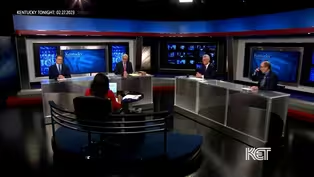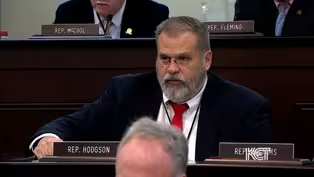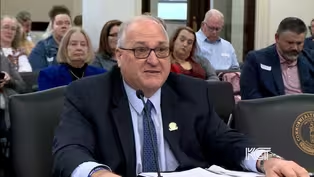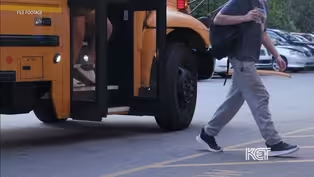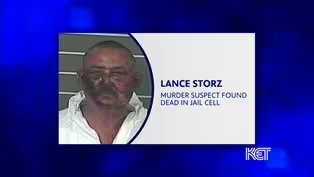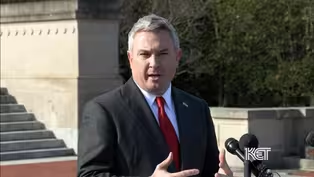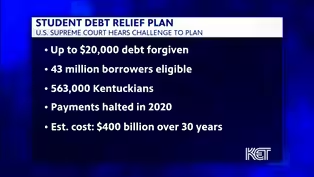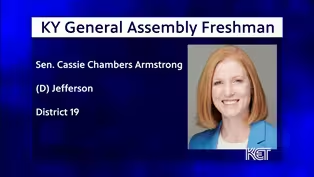
House Bill 3 Juvenile Justice System
Clip: Season 1 Episode 193 | 4m 52sVideo has Closed Captions
Sweeping changes to Kentucky's juvenile justice system are gaining momentum.
Sweeping changes to Kentucky's juvenile justice system are gaining momentum.
Problems playing video? | Closed Captioning Feedback
Problems playing video? | Closed Captioning Feedback
Kentucky Edition is a local public television program presented by KET

House Bill 3 Juvenile Justice System
Clip: Season 1 Episode 193 | 4m 52sVideo has Closed Captions
Sweeping changes to Kentucky's juvenile justice system are gaining momentum.
Problems playing video? | Closed Captioning Feedback
How to Watch Kentucky Edition
Kentucky Edition is available to stream on pbs.org and the free PBS App, available on iPhone, Apple TV, Android TV, Android smartphones, Amazon Fire TV, Amazon Fire Tablet, Roku, Samsung Smart TV, and Vizio.
Providing Support for PBS.org
Learn Moreabout PBS online sponsorshipSweeping changes to Kentucky's juvenile justice system are gaining momentum as the House makes haste and moving a bill to the upper chamber.
This morning, a House committee today passed House Bill three, a juvenile justice bill sponsored by Representative Kevin Bratcher.
It comes at a time of increased violence at juvenile justice centers throughout the state.
Among other things, House Bill three makes parents more accountable for their children's attendance in school.
Today, Bratcher told the House appropriation and Revenue Committee about the bill's other key components.
If a child is convicted or adjudicated or confesses to a violent crime, his or her records will be open for three years.
And if no longer any other crimes in those three years, the records will be closed.
And the third is there will be a 48 hour maximum.
Hold on any juvenile arrested for violent crime.
The committee also heard from opponents of the bill's detention and open records provisions.
So why are we interested in opening at the records of kids?
And this is my last appeal here, because I want to make it personal.
How many of you made bad decisions when you were younger?
Decisions that maybe you were held accountable for or some you maybe got away with.
Some are taken to the grave.
Some you won't be held accountable until judgment day.
Right.
We feel very strongly that there needs to be flexibility in dealing with young people, and sometimes detention is appropriate.
But other time, this is not adjudicated.
These are charges.
And I think that kind of mandatory detention would not be appropriate.
And in all cases, and oftentimes incarceration is not the right initial approach with young people and does not lead to good outcomes.
So we would raise a lot of concern about that.
And to the bill supporting behavioral health and long term mental health treatment for juveniles.
The committee voted 20 to 2 for the bill with two members passing, sending it on to the full House where it landed today.
This afternoon it was called up for a floor vote, so the entire House membership could vote on it.
As you heard earlier, one key provision that drew some pushback was over open juvenile records and fears of lost confidentiality.
Under the bill, kids who commit violent crimes like murder, assault, manslaughter and sexual assault, their records would be opened or unsealed for three years.
Louisville lawyer and Republican caucus whip Jason Amos worked on House Bill three and tried to convince critics of the importance of open juvenile records for that period of time.
But here's why those records have to be open.
This is just for three years after the offense.
So if they're 16, they would be close at 19 for 17 to be close to 20.
Well, the problem, if you don't have it and again, we're only talking about children who have been convicted of admitted to these violent offenses is if you don't have that, when somebody becomes 18, they can walk into a gun store and buy and they are.
So they could have a long history of committing crimes while they're 15, 16, 17.
And then when they turn 18, they can go into a gun store and buy an air.
I don't think anybody wants that.
The latest version of the bill calls for the Jefferson County Youth Detention Center, which would be state owned and renovated to increase capacity to 40 beds.
$39 million are being allotted to help make improvements to the juvenile justice system.
A law, a Democrat, complained about how that money is being directed while Republicans maintain the measure is designed to help troubled kids while keeping communities safe.
My issue is, is that we are.
This bill ends up putting, what, $39 million into pretty much incarcerating our young people.
I am happy about the changes made to the mental health provisions, but it's not enough.
We cannot spend $39 million on incarcerating kids and not spend a penny on reentry, on intervention, on prevention, and on alternatives to detention.
So my question is this What about the victims?
Where is their justice?
Why are we not standing up for them?
And I believe that this bill does that.
The juvenile justice reform measure cleared the House 79 to 18 and now moves on to the Senate for consideration there.
American Printing House for the Blind Expansion
Video has Closed Captions
Clip: S1 Ep193 | 3m 42s | The American Printing House for the Blind's plans for expansion. (3m 42s)
Video has Closed Captions
Clip: S1 Ep193 | 3m 49s | Lawmakers are considering gambling legislation this session. (3m 49s)
House Bill 135 Autonomous Vehicles
Video has Closed Captions
Clip: S1 Ep193 | 1m 50s | A discussion about autonomous vehicles and House Bill 135. (1m 50s)
House Bill 201 Automated Speed Enforcement
Video has Closed Captions
Clip: S1 Ep193 | 1m 15s | House Bill 201 would create a pilot program for automated speed enforcement. (1m 15s)
House Bill 257 Disaster Relief Funds
Video has Closed Captions
Clip: S1 Ep193 | 56s | Disaster relief funds would have more state control of House Bill 257 becomes law. (56s)
House Bill 288 Teacher Misconduct
Video has Closed Captions
Clip: S1 Ep193 | 1m 16s | House Bill 288 would set standards for teacher misconduct allegations. (1m 16s)
Video has Closed Captions
Clip: S1 Ep193 | 58s | House Bill 331 could potentially save lives. (58s)
House Bill 538 Student Discipline
Video has Closed Captions
Clip: S1 Ep193 | 2m 22s | House Bill 538 is meant to give more flexibility in disciplinary matters. (2m 22s)
House Bill 5 Bourbon Tax Break
Video has Closed Captions
Clip: S1 Ep193 | 1m 56s | Debate on House Bill 5 dealing with a tax break for the bourbon industry. (1m 56s)
Video has Closed Captions
Clip: S1 Ep193 | 54s | The man accused of opening fire on three officers was found dead in his jail cell. (54s)
Ryan Quarles Supports Medical Marijuana.
Video has Closed Captions
Clip: S1 Ep193 | 1m 29s | Ryan Quarles pledged to legalize medical marijuana in his first year as governor. (1m 29s)
Video has Closed Captions
Clip: S1 Ep193 | 1m | U.S. Supreme Court heard arguments for student loan forgiveness plan. (1m)
Sen. Cassie Chambers Armstrong (D) District 19
Video has Closed Captions
Clip: S1 Ep193 | 3m 38s | KY General Assembly Freshman: Sen. Cassie Chambers Armstrong (D) District 19 (3m 38s)
Providing Support for PBS.org
Learn Moreabout PBS online sponsorship
- News and Public Affairs

Top journalists deliver compelling original analysis of the hour's headlines.

- News and Public Affairs

FRONTLINE is investigative journalism that questions, explains and changes our world.












Support for PBS provided by:
Kentucky Edition is a local public television program presented by KET

